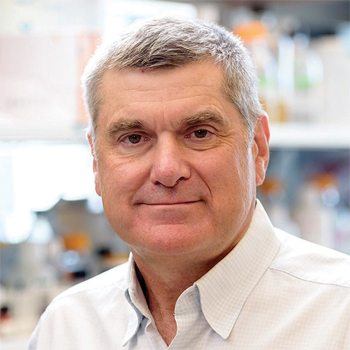Thompson honored as ‘exemplary scientist’ in cancer biology
Craig B. Thompson, president and CEO of Memorial Sloan Kettering Cancer Center, is the recipient of the American Society for Biochemistry and Molecular Biology’s 2019 Bert and Natalie Vallee Award in Biomedical Science. The award honors an established scientist for outstanding accomplishments in basic biomedical research. Thompson’s lab studies cancer cell metabolism.

— Craig Thompson
Thompson is a pioneer in the field of cancer biology. His findings have challenged existing notions about mammalian cell metabolism and its regulation. Contrary to earlier findings that mammalian cells take up nutrients autonomously, Thompson demonstrated that growth factor signaling is essential for glucose and amino acid uptake by cells for ATP synthesis. Without growth factors and hormones, cells ultimately undergo apoptosis. However, oncogenic transformation of mammalian cells alters the regulation of cellular metabolism. Due to activation of the oncogene Myc, cancer cells switch to using glutamine instead of glucose as an energy source. This allows glucose metabolites to be directed to nucleotide synthesis, which aids in uncontrolled cell proliferation.
Thompson’s group showed how mutations in genes coding for metabolic enzymes lead to several forms of cancer. Over the years, his work has established beautifully how cellular metabolism regulates signal transduction and gene expression and how oncogenic transformation alters these mechanisms. He also has contributed to the development of treatment for autoimmune diseases.
Joan Massagué, director of the Sloan Kettering Institute, nominated Thompson for the award. “Dr. Thompson’s research elucidating cancer cell metabolism is pioneering, visionary and of outstanding quality,” Massagué wrote in his nomination letter. “He has established a reputation as one of the most thoughtful and accomplished investigators in the field of cancer research.”
Thompson received his undergraduate degree in biochemistry from Dartmouth College in 1974, followed by a medical degree at the University of Pennsylvania in 1977. He served as medical officer at the Naval Blood Research Institute and National Naval Medical Center before being appointed an assistant professor of medicine and microbiology and immunology at the University of Michigan. He went on to become a professor in the departments of medicine and molecular genetics and cell biology at the University of Chicago, an investigator at the Howard Hughes Medical Institute, and then a professor and chair of the department of cancer biology at the University of Pennsylvania. In 2010, he was appointed president and CEO of Memorial Sloan Kettering Cancer Center.
Thompson has co-authored more than 400 peer-reviewed articles, has been cited more than 93,000 times and holds 30 patents. He also serves in leadership positions at various scientific organizations.
As the Vallee award recognizes outstanding achievements in sciences basic to medicine, Thompson fits the bill as a “champion of cancer research,” Massagué wrote in his nomination letter.
Enjoy reading ASBMB Today?
Become a member to receive the print edition four times a year and the digital edition monthly.
Learn moreGet the latest from ASBMB Today
Enter your email address, and we’ll send you a weekly email with recent articles, interviews and more.
Latest in People
People highlights or most popular articles

Fueling healthier aging, connecting metabolism stress and time
Biochemist Melanie McReynolds investigates how metabolism and stress shape the aging process. Her research on NAD+, a molecule central to cellular energy, reveals how maintaining its balance could promote healthier, longer lives.

Mapping proteins, one side chain at a time
Roland Dunbrack Jr. will receive the ASBMB DeLano Award for Computational Biosciences at the ASBMB Annual Meeting, March 7–10, just outside of Washington, D.C.

2026 voter guide
Learn about the candidates running for Treasurer-elect, Councilor and Nominating Committee.

Meet the editor-in-chief of ASBMB’s new journal, IBMB
Benjamin Garcia will head ASBMB’s new journal, Insights in Biochemistry and Molecular Biology, which will launch in early 2026.

Exploring the link between lipids and longevity
Meng Wang will present her work on metabolism and aging at the ASBMB Annual Meeting, March 7-10, just outside of Washington, D.C.

Defining a ‘crucial gatekeeper’ of lipid metabolism
George Carman receives the Herbert Tabor Research Award at the ASBMB Annual Meeting, March 7–10, just outside of Washington, D.C.

